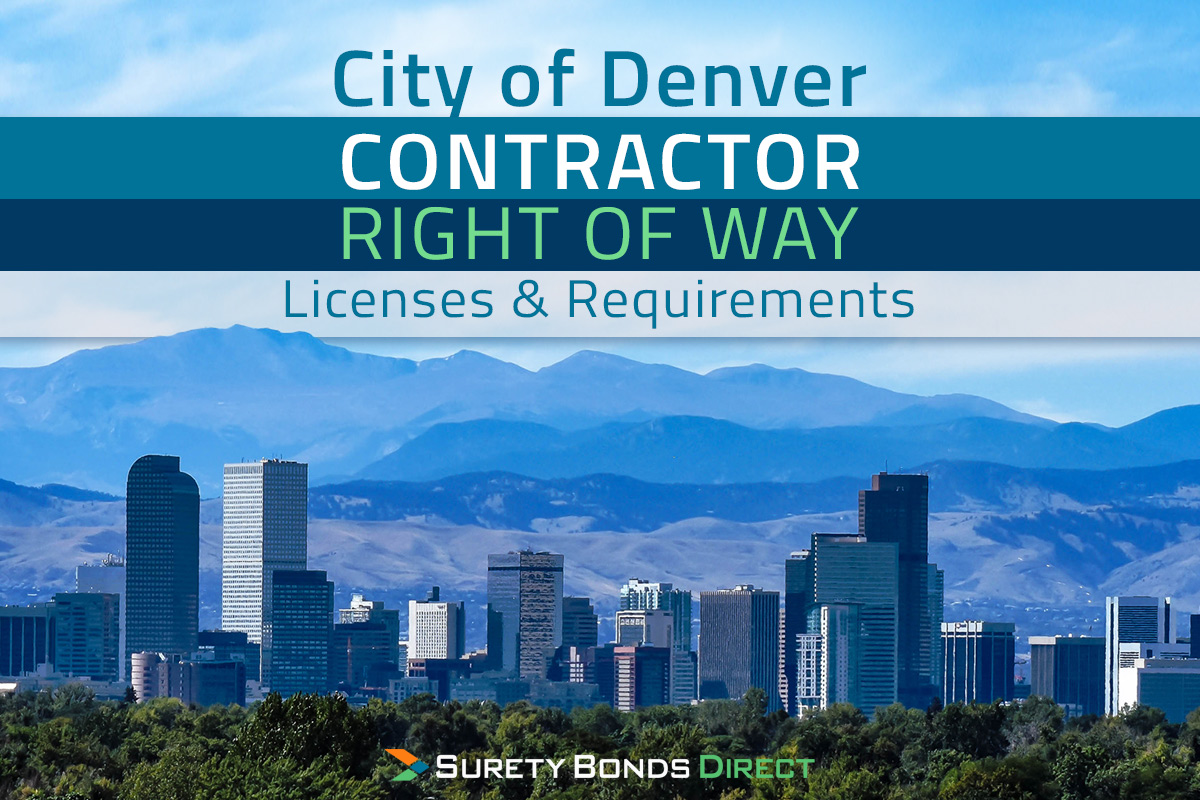A right of way is any surface including the air above the space or below the surface of any public street, highway, lane, path, alley, sidewalk, avenue, road, tunnel, any surface or structure that belongs to the public (or the city).
Right of way contractors in Denver have their own license requirements. The good news is applying for these licenses is not a complicated process.
This short article will outline:
- The different types of right-of-way licenses
- The scope of work for each license
- The surety bond requirement
- The insurance requirement
- Plus all the links you need to get your application submitted
Denver Contractor Right Of Way Licenses And Scopes of Work
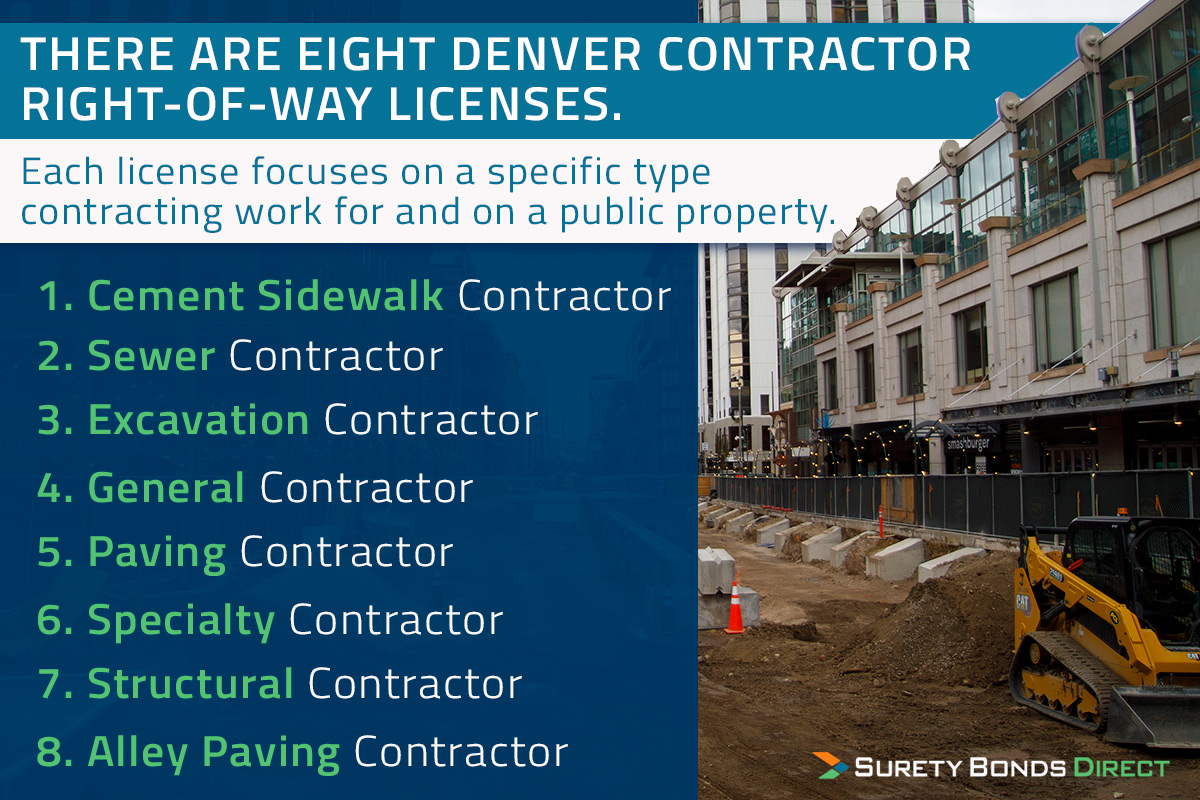
There are eight Denver contractor right-of-way licenses. Each license focuses on a specific type contracting work for and on a public property.
Here's a list with the scope of work and any additional requirements each city of Denver contractor license may need.
1. Cement Sidewalk Contractor
This right of way license is responsible for:
- Laying sidewalks
- Laying and paving driveways
- Making curb cuts and laying or curbs
- Installation of gutters
- Installation of minor drainage structures connected to public places or structures
2. Sewer Contractor
This license is responsible for both public and private:
- Opening or uncovering of sanitary sewers or storm drain sewers
- Laying of sanitary or storm drain sewers
Notice this license includes private work because private sewer systems have to go through public city rights-of-way.
3. Excavation Contractor
This license is required when any excavation, digging and moving of earth, must occur in any public property of the city.
4. General Contractor
A general contractor is the catch-all contractor license. A general contractor license can perform work relating to:
- Sewer
- Sidewalks
- Structural contracting
- Paving
- Excavating
- Specialty contracting
5. Paving Contractor
This license includes work relating to any street or alley work:
- Laying of gravel base course
- Asphalt or concrete paving
- Laying of concrete curbs or gutter
- Concrete sidewalks
- Public driveways
- Drainage structures and other incidental work to the street or alley in the public right-of-way
6. Specialty Contractor
The specialty license is responsible for:
- Constructing and installing traffic control devices
- Installation of fencing
- Public lighting projects
- Water lines including sprinkler systems
This license includes any device, object, structure not covered by:
- General contracting licenses
- Structural contractor licenses
- Sewer contractor licenses
- Paving contractor licenses
- Sidewalk and driveway contractor licenses
7. Structural Contractor
The structural license is responsible for constructing:
- Bridges, including viaducts
- Public buildings
- Any other public and private structure in the public right-of-way or public property
8. Alley Paving Contractor
Similar to the paving contractor, the alley paving contractor is responsible for:
- Laying gravel base course
- Paving with asphalt or concrete
- Laying concrete curb or street gutter
- Constructing concrete sidewalks and driveways
- Installation of drainage structures
The difference is the alley contractor only does work in city alley ways, no public streets.
Denver Street Cut Pavement Repair Markers
Because every right-of-way license performs contracting work on public property where the public live their daily life, there are strict requirements of pavement markers.
These rules include things such as:
- When the street markers are to be installed
- The grading of the markers based on the type of project
- The color of the markers to clearly identify the type of project
- Plus many more rules based on the type of work being performed
Denver Right-of-Way Contracting Experience
Every license with the exception of sewer contractors and general contractors require 5 years of verified experience in the respective license.
Additional Experience Requirements For Sewer and General Contractors
Both sewer and general contracting licenses must have the 5 years of verifiable experience and a State of Colorado Licensed Master Plumber or Denver certified Drain Layer Supervisor employed at all times during the project.
The Denver Right-of-Way Surety Bond Requirements
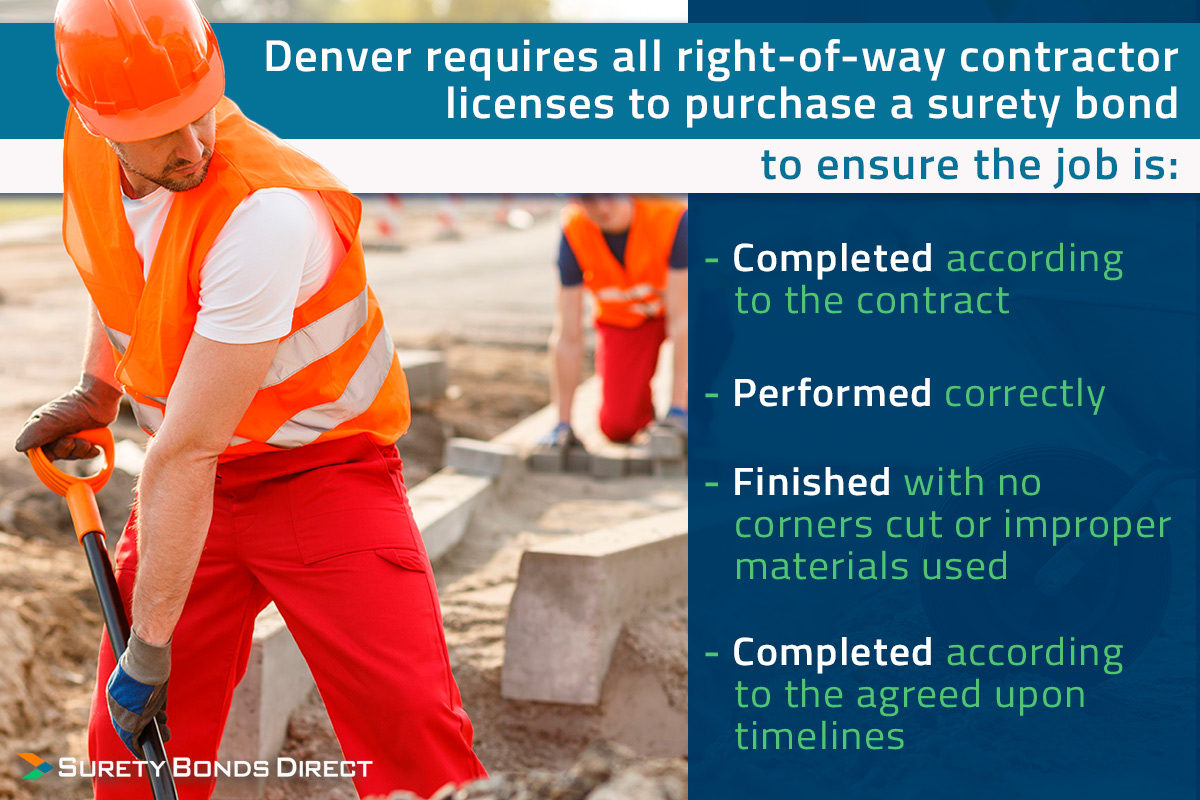
Because contractors hired by the city of Denver will be performing work on public rights of way, a surety bond is required to ensure the job is:
- Completed according to the contact
- Performed correctly
- Finished with no corners cut or improper materials are used
- Even make sure the job is completed according to the agreed upon timelines
Unlike most states, Colorado does not have a statewide contractor license bonding requirement. However, each city, county, or project may have its own specific bonding requirement, such as Denver's right of way bonding requirements.
If the surety bond requirement is new to you, you may be confused as to:
- What a surety bond is
- How to get one
- How much a surety bond costs
- Plus how often you have to purchase it
Before we get into the details of a surety bond, keep in mind, each license is required to purchase it's own bond. So if you hold multiple licenses, you'll need to purchase the required bond for that license.
What is a Denver Contractor Surety Bond?
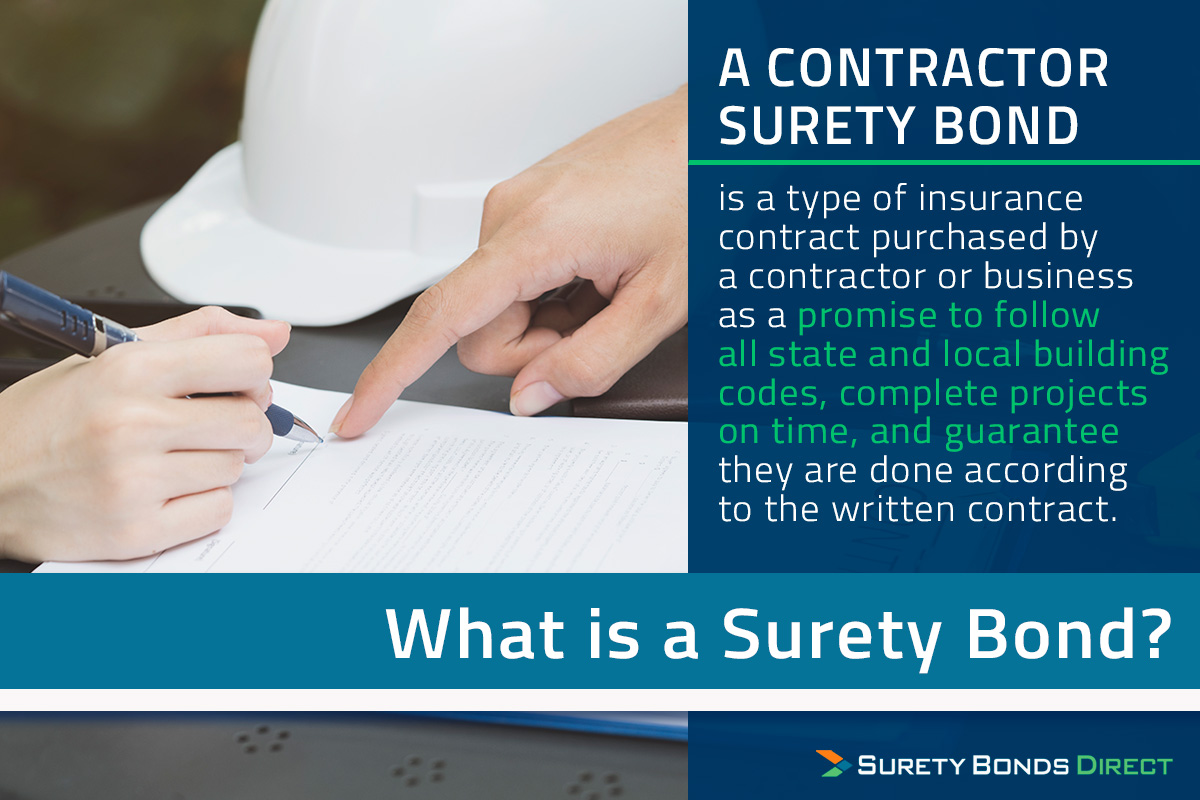
A contractor surety bond is a type of insurance contract purchased by a contractor or business as a promise to follow all state and local building codes, complete projects on time, and guarantee they are done according to the written contract.
It's unfortunate that there are contractors who will purposefully cut corners or commit fraud that causes financial harm to their customers.
It's because of these contractors that Denver requires every contractor performing any right-of-way work to be bonded.
How To Purchase a Surety Bond And How Much Does It Cost?
It's best to purchase a surety bond through a specialized surety agency like Surety Bonds Direct.
Specialized surety agencies work with multiple sureties, the insurance companies that write surety bonds, to secure the lowest possible price. And for Denver right-of-way bonds, Surety Bonds Direct has secured low fixed prices for most of the surety bonds.
The cost of a Denver contractor bond is based on the bond amount.
Here's a table of the bond amounts and pricing based on the right-of-way license that are available for instant purchase.
| Denver Right-of-Way License | Bond Amount | Pricing Options |
|---|---|---|
| Cement Sidewalk Contractor | $10,000 | $100 for 1 year term |
| $175 for 2 year term | ||
| $250 for 3 year term | ||
| Sewer Contractor | $50,000 | $500 for 1 year term |
| $875 for 2 year term | ||
| Excavation Contractor | $50,000 | $500 for 1 year term |
| $875 for 2 year term | ||
| Special Contractor | $10,000 | $100 for 1 year term |
| $175 for 2 year term | ||
| Structural Contractor | $25,000 | $250 for 1 year term |
| $437.50 for 2 year term | ||
| Alley Paving Contractor | $25,000 | $250 for 1 year term |
| $437.50 for 2 year term | ||
| Paving Contractor | $50,000 | Custom pricing required |
| General Contractor | $50,000 | Custom pricing required |
Denver General Contractor and Paving Contractor License Bond Cost

Both the Denver general contractor and the paving contractor have $50,000 bond amounts.
Because of the nature of the projects involved with these licenses, the price for these bonds will depend upon a custom rate quoted by a surety.
Remember, the surety is the insurance company that underwrites surety bonds. And when quoting a rate, the surety will take into account these three factors:
- The personal credit of the contractor or business members
- The business and industry experience
- Prior bond claims (if applicable)
This is why working with a specialized surety agency is so valuable.
At Surety Bonds Direct, we will go shopping for you, collect multiple rates from different sureties, and deliver the lowest rate to you.
How Often Do You Have to Purchase a Denver Contractor Bond?
In the table above you probably noticed, for many of the bonds, you could purchase for a 1 to 3 year term.
The bond term is how long the bond remains active before you're required to renew it.
You can save money by purchasing your bond for multiple years. Plus you won't have to worry about it for a longer period of time.
The general contractor and paving contractor bonds have bond terms for 12 months at which time they will have to be renewed.
The renewal process is simple. It only requires paying the renewal premium and your same bond will remain active. You won't have to worry about having a new bond issued or having to file the bond with the city of Denver.
As you can see, the concept of becoming a bonded contractor is not as complicated as it first sounds.
Denver Right-of-Way Insurance Requirements
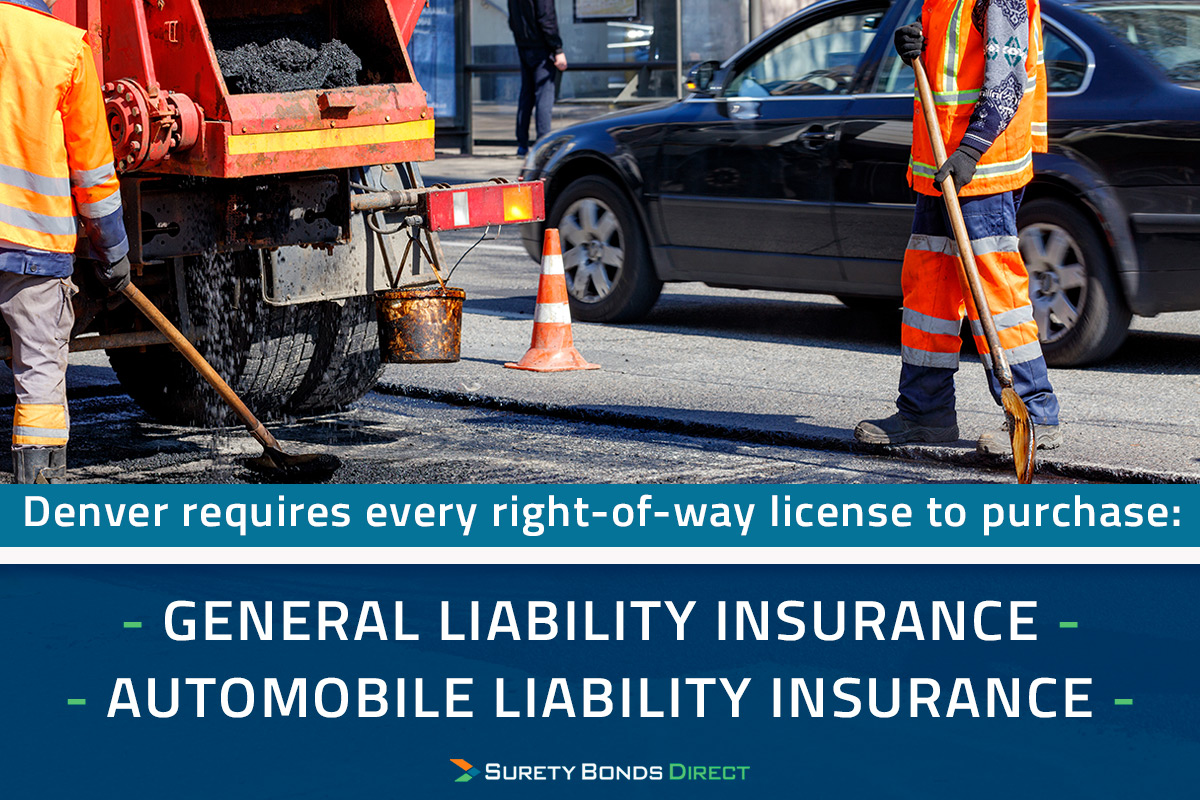
Denver requires every right-of-way licensee to purchase:
- General liability insurance
- Automobile liability insurance
The City and County of Denver must be listed on all policies as Additionally Insured.
The minimum amounts for general liability are as follows:
| Coverage | Minimum Limits |
|---|---|
| Commercial General Liability | Each Occurence: $1,000,000 |
| General Aggregate Limit: $2,000,000 | |
| Products Completed Operations Aggregate Limit: $2,000,000 | |
| Personal & Advertising Injury: $1,000,000 | |
| Fire Damage: $50,000 |
The minimum amount for automobile liability is as follows:
| Coverage | Minimum Limits |
|---|---|
| Business Automobile Liability | Coverage Single Limit: $1,000,000 |
You can find the specific insurance rules here.
Purchase The Correct Right-of-Way Surety Bonds From Surety Bonds Direct

I hope this article helped you understand the licensing process for Denver right-of-way contractor licenses.
As you can see, applying for the license, is a straight forward process.
When it comes to satisfying the surety bond requirement so you can get your license issued, get a free, no obligation, price quote from Surety Bonds Direct.
Remember, most of the right-of-way surety bonds have low fixed prices where you can instantly purchase the bond and have it issued within one day.
If you require a general or paving contractor bond, Surety Bonds Direct will help secure a low price quote within one business day.
If you prefer to speak with a bond specialist, call 1-800-608-9950.
